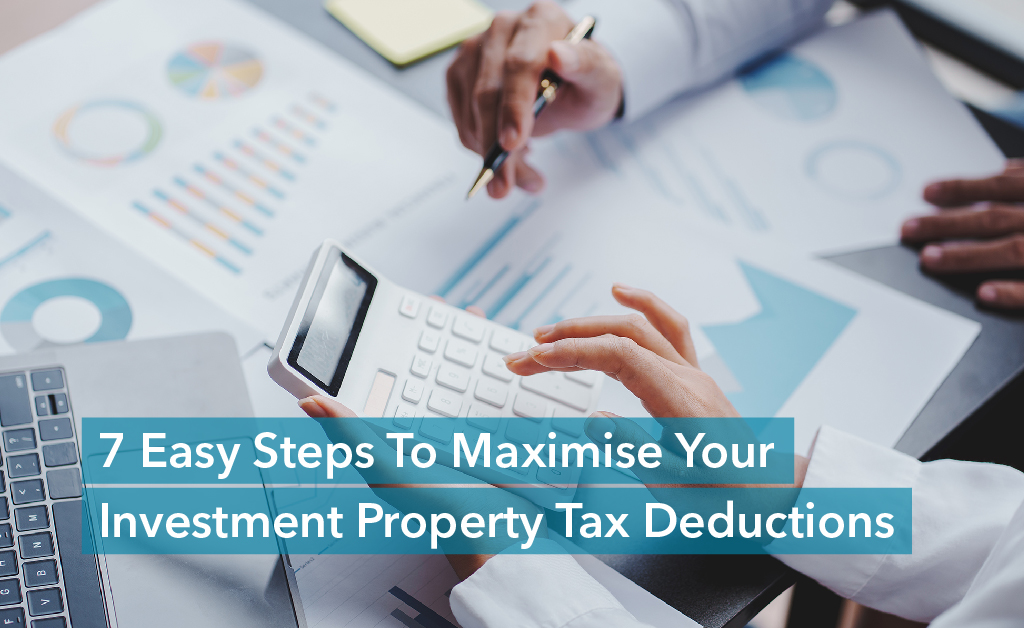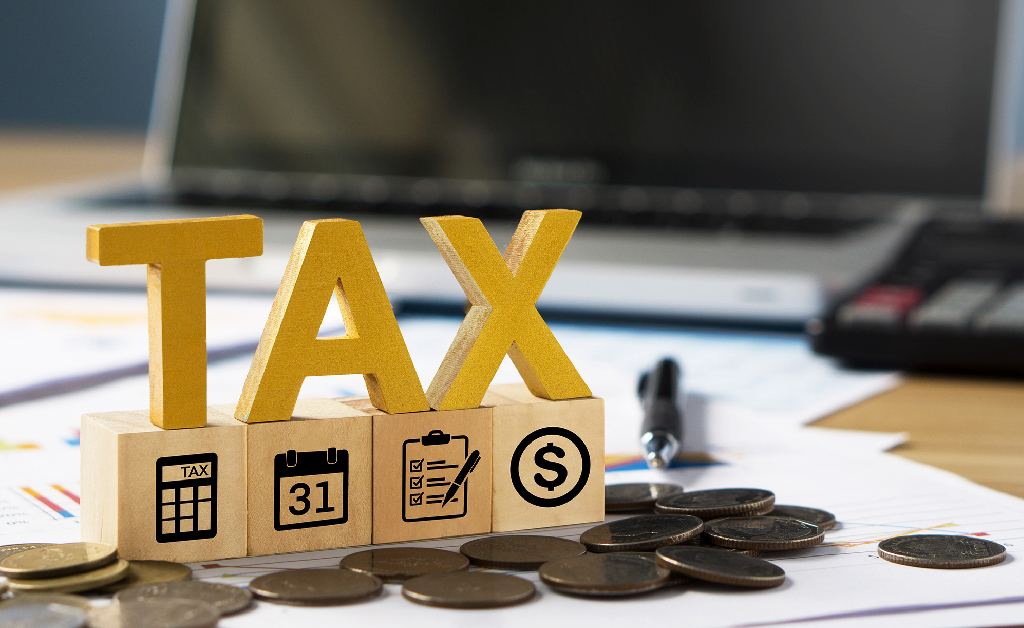
Investment properties can be a lucrative venture, but managing your taxes effectively is crucial to maximising your returns. By understanding the tax deductions available to you as a property investor, you can significantly reduce your tax liability and increase your cash flow. In this article, we will explore seven easy steps to help you maximise your investment property tax deductions and make the most of your investment.test

What Are Investment Property Tax Deductions?
First things first: before diving into the steps that will allow property investors to take advantage of tax deductions maximally, let’s define what they are in the context of property investments.
Investing in property is a popular strategy for wealth creation in Australia. Not only can it provide a regular stream of income through rental payments, but it can also offer long-term capital growth. However, as a property investor, understanding the tax deductions available to you is crucial for optimizing your financial outcomes.
Investment property tax deductions refer to the expenses that property owners can claim as deductions to reduce their taxable income, ultimately lowering the amount of tax they owe. These deductions are specific to properties that are held for investment purposes, such as rental properties, and they can help property owners maximize their financial returns.
Tax deductions for property investments allow you to reduce your taxable income by claiming eligible expenses associated with owning and managing investment properties. By deducting these expenses, you can minimise the amount of tax you owe, potentially increasing your cash flow and overall return on investment.
Deductible Expenses for Property Investments
The following are the expenses that can be deducted from your property investments:
Interest on Loans
Interest on loans used to finance the purchase or improvement of an investment property is generally tax-deductible. This includes mortgage interest, loan establishment fees, and interest on any loans used for renovations or repairs.
Repairs and Maintenance
Expenses incurred for repairs, maintenance, or general upkeep of the property can be claimed as tax deductions. These may include plumbing repairs, painting, replacing broken fixtures, or landscaping costs. It’s important to note that expenses incurred for initial repairs before the property was available for rent may have different tax treatment.
Insurance Premiums
Insurance premiums for policies covering the investment property, such as landlord insurance, can be claimed as tax deductions. This ensures that you’re adequately protected against potential risks and losses associated with owning a rental property.
Depreciation
Depreciation refers to the gradual wear and tear of assets within the property over time. You can claim depreciation as a tax deduction, which can significantly reduce your taxable income.
Pro-Tip: Consult with a quantity surveyor to help you accurately determine the depreciation value of your property and its assets.
Non-Deductible Expenses for Property Investments
While there are several deductible expenses, certain costs are generally not eligible for tax deductions. These include the initial purchase price of the property, expenses unrelated to the investment property, and any private use of the property. It’s essential to differentiate between deductible and non-deductible expenses to avoid any potential issues with the Australian Taxation Office (ATO).
Capital Gains Tax
When you sell an investment property, you may be liable for capital gains tax (CGT) on the profit made from the sale. However, certain exemptions and concessions are available that can help minimize your CGT liability. Seeking advice from a qualified tax professional can assist you in understanding your CGT obligations and potential strategies for reducing the tax burden.
Maximising Your Tax Deductions In 7 Easy Steps

The following are the seven steps every property investor must know so they are informed of the benefits they are eligible for and the further solutions they should undertake to maximise them.
Step 1: Know The Claims You Are Entitled To
It could not be stressed enough that it is essential to know all your eligible expenses and the claims you are entitled to. Apart from the ones discussed earlier, you can make claims on the following:
Council Claims
Council claims, also known as council rates deductions, refer to the tax deductions that property owners can claim for the council rates they pay on their investment properties. Council rates are fees levied by local government authorities to fund various services and infrastructure in the area where the property is located.
Water Rates
Water rates, also known as water utility charges, are fees levied by water authorities for the supply of water and sewerage services to properties. Property owners may be eligible to claim tax deductions on water rates paid for their investment properties, subject to specific rules and regulations.
Land Taxes
Land taxes can have different implications depending on the jurisdiction and specific regulations in place. Generally, land tax is a tax levied by the government on the ownership of land. However, the availability of tax deductions for land taxes on property investments can vary.
Strata Fees
Strata fees, also known as body corporate fees, are recurring payments made by property owners in a strata-titled property or a property within a community or homeowners’ association. These fees contribute to the maintenance and management of shared areas and services, such as common spaces, elevators, landscaping, and building insurance.
The Australian Tax Office (ATO) maintains specific rules in claiming deductions on your investment property. Property investors must gain a comprehensive understanding of what expenses can and must be claimed, empowering you to maximise your entitlements.
Step 2: Maintain Accurate Records
Keeping accurate records is the foundation of successful tax planning. Maintain a separate bank account for your investment property and track all income and expenses associated with it. Keep receipts, invoices, and other relevant documents organized and easily accessible. This meticulous record-keeping will ensure that you can claim all eligible deductions and provide evidence in case of an audit.
Step 3: Know The Claims You Are Not Entitled To
As a property investor, it’s important to distinguish between repairs, maintenance, and capital improvements. This knowledge can save you from costly errors on your tax return.
Repairs refer to fixing damage or deterioration, while maintenance involves preemptive work. Capital improvements, however, encompass new asset purchases or improvements beyond the original state. Understanding what you can’t deduct from your taxes is crucial. Armed with this clarity, you can correctly categorise your expenses and safeguard against potential audits.
Step 4: Engage a Qualified Accountant or Tax Advisor
Managing investment property taxes can be complex, and tax laws are subject to change. Engaging a qualified accountant or tax advisor who specializes in property investment can provide invaluable guidance. They can help you identify and claim all eligible deductions, ensure compliance with tax regulations, and maximize your tax benefits. A professional will stay up-to-date with the latest tax laws and advise you on strategies specific to your investment goals.
Step 5: Familiarise Yourself With Depreciation Deductions
Depreciation deductions allow you to claim the decline in the value of your investment property and its assets over time. Engage a quantity surveyor to prepare a tax depreciation schedule, which will outline the depreciation deductions you can claim for each item. This includes the building structure, appliances, fixtures, and fittings. Maximising depreciation deductions can lead to significant tax savings, so it’s important to have an accurate and up-to-date depreciation schedule.
Step 6: Consider Your Capital Gains Tax
As stated in an earlier segment, Capital Gains Tax (CGT) factors into your tax deductions in that it may apply to your investment property. However, there are strategies to minimise your CGT liability. Holding the property for at least 12 months may make you eligible for a 50% CGT discount. Additionally, you can consider leveraging the benefits of the main residence exemption if you have lived in the property before renting it out.
Step 7: Use Your Expenses to Offset Your Taxable Deductions
You can lower your taxable income and maximise your tax deductions by prepaying some of your investment property expenses. The Australian Taxation Office (ATO) allows investors to deduct expenses incurred in the same financial year. This includes advertising for tenants, insurance, rates and taxes, repairs and maintenance costs, and travel expenses.
Borrowing costs, such as loan establishment fees, title search fees, and legal expenses, are also deductible. If you’ve borrowed money to finance your investment property, you may be able to claim back some or all of these costs. Remember to keep records of your borrowing costs and the date they were incurred to easily claim them back when you file your tax return.
Take Advantage Of Your Tax Deductions!

Maximising your investment property tax deductions is a critical aspect of achieving financial success as a property investor. By following these seven easy steps, you can enhance your tax efficiency, increase your cash flow, and ultimately maximise your returns on investment.
With careful planning and attention to detail, you can optimise your tax position and make the most of your investment property.
Want to learn more about how you can build your wealth through your property investment? Keep following our content or reach out to any of our professionals here at Maple Property Investment. We would be more than happy to assist you with your property investment goals so you can start enjoying their returns.
FAQs
Can I claim the cost of repairs for my investment property?
Yes, you can claim the cost of repairs and maintenance as tax deductions for your investment property. Keep records and receipts to support your claims.
What is negative gearing, and how does it affect my taxes?
Negative gearing refers to when the expenses of owning an investment property exceed the rental income it generates. This loss can be offset against other income, potentially reducing your overall tax liability.
Can I claim travel expenses related to my investment property?
In most cases, you cannot claim travel expenses for visiting your investment property, unless it is for repairs or inspections directly related to the property’s maintenance.
Are there any restrictions on claiming depreciation deductions?
Depreciation deductions are subject to certain restrictions. For example, you cannot claim deductions on assets that were purchased second-hand and have already been claimed by a previous owner.
How can I determine the appropriate depreciation deductions for my investment property?
Consulting a quantity surveyor is advisable for accurately determining the depreciation deductions for your investment property. They will assess the property and prepare a depreciation schedule based on its specific features and assets.
